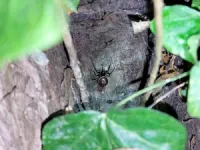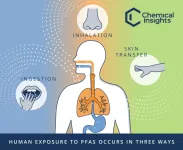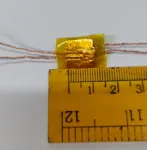(Press-News.org) Woods Hole, Mass. (Feb. 21, 2023) -- When the Covid-19 pandemic hit in 2020 with associated travel restrictions, Matthew Long thought his students could shift their overseas research projects to instead study the seagrass meadow ecosystem in Waquoit Bay. It’s a shallow, micro-tidal estuary on the south side of Cape Cod in Massachusetts, near the Woods Hole Oceanographic Institution (WHOI) where Long is an associate scientist in the Marine Chemistry and Geochemistry Department.
However, when Long and his students looked for seagrass meadows where he had seen them in previous years, there were only a few shoots of dying Zostera marina eelgrass, a type of seagrass.
That prompted Long and Jordan Mora, a restoration ecologist with the Association to Preserve Cape Cod, to analyze decades’ worth of local environmental monitoring data to find out what has happened to the estuary. What they determined is that Waquoit Bay has shifted from a benthic to a pelagically-dominated ecosystem due to human causes, including an excess influx of nutrient pollution along with climate change.
That disruption to Waquoit Bay’s ecosystem presents broad concerns about the fate of coastal estuaries worldwide, according to the researchers.
In addition, the researchers point to the importance of tapping into and analyzing long-term monitoring data to better understand the changes to Waquoit Bay and potentially to other estuaries as well.
The water quality and overall health of estuaries continue to degrade due to excess nutrients from leaching septic systems, agricultural runoff, and other anthropogenic sources, the researchers note. In addition, warming water temperatures from climate change, particularly in the northeastern United States, exacerbates the nitrogen loading problem by reducing dissolved oxygen levels and accelerating microbial metabolism which further reduces oxygen levels.
“This shift toward pelagic dominance in Waquoit Bay may indicate that other eutrophic and warming estuaries may also shift toward pelagic dominance in the future, as the Northeastern US is one of the fastest warming,” according to “Deoxygenation, Acidification and Warming in Waquoit Bay, USA, and a Shift to Pelagic Dominance,” a paper co-authored by Long and Mora published in Estuaries and Coasts, the journal of the Coastal and Estuarine Research Federation. “The range of nitrogen loading across the Waquoit Bay sub-watersheds is comparable to the range of nitrogen loading across 90% of the world’s estuaries making it an ideal site for investigating eutrophication impacts.”
The scientists note that their research results in Waquoit Bay “cannot disentangle the contributions of global change or eutrophication to estuary decline. However, they do point to a potential combined effect that may result in other similar estuaries becoming dominated by pelagic metabolism in the future, and the resulting deleterious effects of harmful algal blooms, hypoxia, and the loss of species diversity and ecosystem function.”
The researchers’ analyses revealed recent and unexpectedly large increases in chlorophyll a concentrations, an indicator of microalgal blooms, in the water column throughout the estuary, which coincided with ongoing decreases in macroalgal density on the bottom of the estuary. In addition, the analyses showed an increase in temperature over the last 20 years and significant declines in oxygen and pH levels, among other changes.
The analyses relied on long-term monitoring data collected over decades from two monitoring programs coordinated by the Waquoit Bay National Estuarine Research Reserve, including the reserve’s System-Wide Monitoring Program and the Waquoit BayWatchers, that latter of which is a citizen science water quality monitoring program.
One of the main objectives of the current study was to apply time-series analysis techniques and substantial knowledge about the history of the monitoring programs to reveal long-term trends in water quality, according to the paper. “These methods can be applied to other monitoring data to advance the knowledge gained from similar monitoring programs, enhance our understanding of estuarine biogeochemistry, and investigate estuarine responses to long-term change,” the paper states.
Long said eelgrass provides a number of ecosystem benefits including stabilizing sediments and offering habitat for a variety of organisms. In addition, eelgrass is a great indicator of good estuarine water quality and also serves as a carbon sink.
“Carbon storage is extremely important across the world, and we're actively trying to figure out ways to store and sequester carbon. Seagrass meadows represent a really significant and efficient carbon storage sink,” Long said. “Let's not lose the seagrass meadows and the carbon sequestration that we already have in place, and let's actively maintain and restore seagrass meadows. With the loss of seagrass meadows, such as what we've seen in Waquoit Bay, we're actively releasing that carbon back to the atmosphere.”
Long added that using environmental monitoring data helped to put together the story of the switch from a seagrass-dominated system to a macroalgal-dominated system from the 1980s to the present in Waquoit Bay. Without the long-term data, gradual changes to the system would be more difficult to detect, he said.
“This paper isn’t just significant because it demonstrates that the estuaries on southern Cape Cod, and more generally the northeastern US, are entering a new level of degradation where not even macroalgae or seaweeds can persist, but also because it provides clear evidence that long-term monitoring programs are extremely important and worth maintaining,” said Mora, who worked at the Waquoit Bay National Estuarine Research Reserve for 10 years collecting water quality and submerged vegetation data with visiting scientists, volunteers, and other staff, and witnessed the gradual decline in habitat quality firsthand.
“My hope is that by showing the impact of increasing temperatures on already degraded systems, this paper will help facilitate local and regional management discussions and accelerate the decision-making needed to mitigate the overload of nutrients in our estuaries,” Mora added.
The paper notes that “there is an urgent need to address wastewater handing to improve the estuary, especially in the face of global changes.”
Long said, however, that if local stressors including nutrient pollution can be addressed, and if we can reduce carbon emissions and slow down global warming and the amount of carbon that diffuses into the ocean, “we could turn this situation around before it happens to many similar estuarine systems across the world, preserve the valuable ecological functions of seagrass meadows, and enable their carbon storage potential.”
Funding to support the Marine Biological Laboratory macrophyte data collection was provided by Woods Hole Sea Grant. This research was funded by a WHOI Independent Research and Development grant.
Authors: Matthew H. Long1 and Jordan W. Mora2,3
Affiliations:
1Marine Chemistry and Geochemistry Department, Woods Hole Oceanographic Institution, Woods Hole, MA, USA
2Waquoit Bay National Estuarine Research Reserve, Waquoit, MA, USA
3Association to Preserve Cape Cod, Dennis, MA, USA
About Woods Hole Oceanographic Institution
The Woods Hole Oceanographic Institution (WHOI) is a private, non-profit organization on Cape Cod, Massachusetts, dedicated to marine research, engineering, and higher education. Established in 1930, its primary mission is to understand the ocean and its interaction with the Earth as a whole, and to communicate an understanding of the ocean’s role in the changing global environment. WHOI’s pioneering discoveries stem from an ideal combination of science and engineering—one that has made it one of the most trusted and technically advanced leaders in basic and applied ocean research and exploration anywhere. WHOI is known for its multidisciplinary approach, superior ship operations, and unparalleled deep-sea robotics capabilities. We play a leading role in ocean observation and operate the most extensive suite of data-gathering platforms in the world. Top scientists, engineers, and students collaborate on more than 800 concurrent projects worldwide—both above and below the waves—pushing the boundaries of knowledge and possibility. For more information, please visit: www.whoi.edu
Key takeaways:
• That disruption to Waquoit Bay’s ecosystem presents broad concerns about the fate of coastal estuaries worldwide.
• The water quality and overall health of estuaries continue to degrade due to excess nutrients from leaching septic systems, agricultural runoff, and other anthropogenic sources. In addition, warming water temperatures from climate change, particularly in the northeastern United States, exacerbates the nitrogen loading problem by further reducing dissolved oxygen levels and accelerating respiration rates.
• Researchers analyzed 75 years’ worth of local environmental monitoring data to find out what has happened to the estuary. They point to the importance of tapping into and analyzing long-term monitoring data to better understand the changes to Waquoit Bay and potentially to other estuaries as well.
• “Let's not lose the seagrass meadows and the carbon sequestration that we already have in place, and let's actively maintain and restore seagrass meadows. With the loss of seagrass meadows, such as what we've seen in Waquoit Bay, we're actively releasing that carbon back to the atmosphere.”
END
Excess nutrients lead to dramatic ecosystem changes in Cape Cod’s Waquoit Bay; the bay is a harbinger for estuaries worldwide, say researchers
2023-02-21
ELSE PRESS RELEASES FROM THIS DATE:
New AGA guideline recommends blood and stool tests for monitoring ulcerative colitis
2023-02-21
Bethesda, MD (Feb. 21, 2023) — In new evidence-based guidelines, the American Gastroenterological Association (AGA) recommends non-invasive biomarkers as a first-line strategy for monitoring many patients with ulcerative colitis (UC). These guidelines were published today in Gastroenterology.
The AGA guidelines outline use cases for three biomarkers that provide accurate insights into ulcerative colitis disease activity: serum C-reactive protein (CRP) (blood), fecal calprotectin (stool) and fecal lactoferrin (stool).
“For decades we have regarded endoscopy as the gold ...
RIT researcher awarded NSF CAREER funding to develop advanced computer memory and devices
2023-02-21
Kai Ni was awarded a National Science Foundation CAREER Award to improve computing memory through the use of ferroelectric materials and capacity.
The assistant professor of electrical and microelectronic engineering in RIT’s Kate Gleason College of Engineering, Ni has been at the forefront of advancing ferroelectric memory, a familiar but never widely adopted technology that has the potential to meet the growing demand for more energy-efficient computing performance.
“The appetite for semiconductors just keeps growing. With the data we are generating every day, we need ways to process ...
CHOP researchers develop first effective preclinical models for most common genetic cause of Leigh Syndrome
2023-02-21
Philadelphia, February 21, 2023 – Researchers from Children’s Hospital of Philadelphia (CHOP) developed two new zebrafish models for studying a specific genetic form of mitochondrial disease that represents the most common cause of Leigh syndrome. Using these models, the team identified two drugs already approved by the Food and Drug Administration (FDA) for other conditions that could be repurposed to treat this specific cause of Leigh syndrome. The findings were recently published in the journal Human Molecular Genetics.
SURF1 deficiency ...
Public lecture: how can we have a good future with artificial intelligence?
2023-02-21
Public lecture: how can we have a good future with artificial intelligence?AI expert and educator Professor Anikó Ekárt to discuss one of today’s most provocative topics
Lecture will take place on 28 February at Aston University
Talk to explore artificial intelligence’s capabilities, benefits and pitfalls.
The potential impact of artificial intelligence (AI) on our daily lives will be explored in a public lecture at Aston University.
The University is inviting the public onto its campus on Tuesday 28 February to hear Professor ...
Study finds parents serve as a safety net as grown kids navigate the workforce
2023-02-21
A new study underscores the role that parents play as a safety net for their young adult children as those children navigate the labor market, and highlights the challenges facing young adults who do not have access to parental support.
“In recent decades, we’ve seen a lot of changes in the labor market, from the decline of lifetime employment at one job to the rise of the so-called ‘gig economy,’” says Anna Manzoni, corresponding author of the study and an associate professor of sociology at North Carolina State University. “We wanted to see what role ...
Noble false widow spider found preying on pygmy shrew
2023-02-21
Scientists at University of Galway have published the first record of a noble false widow spider feeding on a pygmy shrew, a species of tiny mammal protected in Ireland.
The new study, recently published in the international journal Ecosphere, demonstrates further the potentially negative impact of the invasive and venomous noble false widow spider on native species.
A recording by Dawn Sturgess showing the spider interacting with the pygmy shrew be downloaded at https://bit.ly/3XPbDKU.
It is the first time a member of this family of spiders, ...
Starch gelatinization, retrogradation, and the world’s fluffiest white bread (video)
2023-02-21
WASHINGTON, Feb. 21, 2023 — If you want to make the fluffiest bread possible, you’re going to need to use chemistry. This week, we explore the science behind starch gelatinization, a phenomenon found in Chinese “tangzhong” and Japanese “yudane” techniques. Then, we put it to the test to see how much gelatinized starch it takes to make the fluffiest, tastiest and most stale-resistant loaf! https://youtu.be/3ziMBDPMuP8
Reactions is a video series produced by the American Chemical Society and PBS Digital Studios. Subscribe to ...
Chemical Insights Research Institute and Emory University’s Rollins School of Public Health team to study the human health impact of PFAS chemical exposure
2023-02-21
ATLANTA – Feb. 21, 2023 – Chemical Insights Research Institute (CIRI) of UL Research Institutes and Emory University's Rollins School of Public Health have announced upcoming research to study human exposure to per- and polyfluoroalkyl substances (PFAS). Data from the Centers for Disease Control and Prevention (CDC) show that approximately 97% of Americans have detectable PFAS levels in their blood. The joint study aims to understand how this exposure occurs and the potential health consequences.
Although humans may be exposed to PFAS by ingesting food or ...
These sports sensors could curb ‘bad calls’ and help players during practices
2023-02-21
If you watched the most recent Super Bowl, you know the importance of a referee’s call on the outcome of a game. Slow-motion replays and close-watching eyes help, but a new sensor technology could someday serve as an even more reliable tool for officials. Researchers reporting in ACS Applied Nano Materials have developed a self-powered, hybrid nanogenerator sensor that could help make more accurate calls and allow boxers and cricket players to practice more efficiently.
As sensors become less complicated and more ubiquitous, their applications have stretched into the world of sports, ...
Black patients more prone to dialysis graft failure
2023-02-21
OAK BROOK, Ill. – Compared to other races, African American patients are more likely to experience premature arteriovenous (AV) graft failure in the treatment of advanced kidney failure, according to a study published today in Radiology, a journal of the Radiological Society of North America (RSNA).
Chronic kidney disease affects roughly 37 million U.S. adults, according to the Centers for Disease Control and Prevention. Over time, chronic kidney disease can result in kidney failure.
One treatment option for advanced kidney failure is hemodialysis, or dialysis, ...







